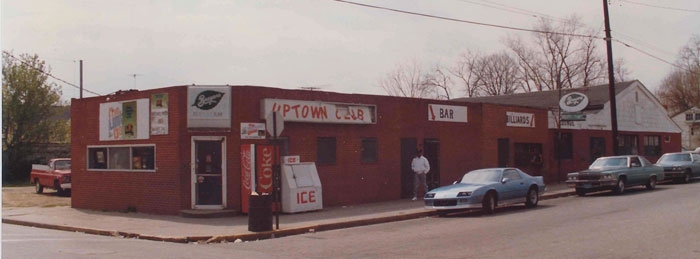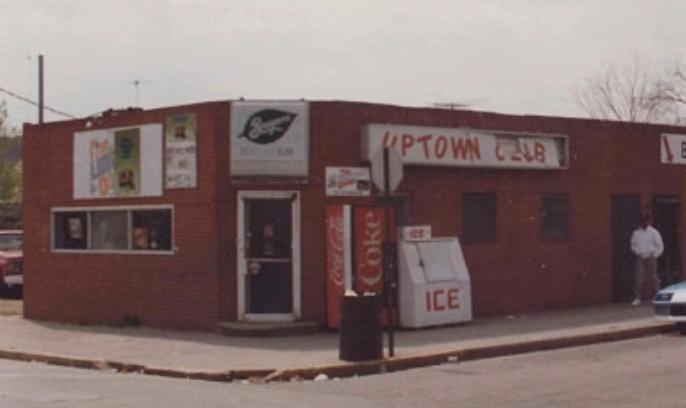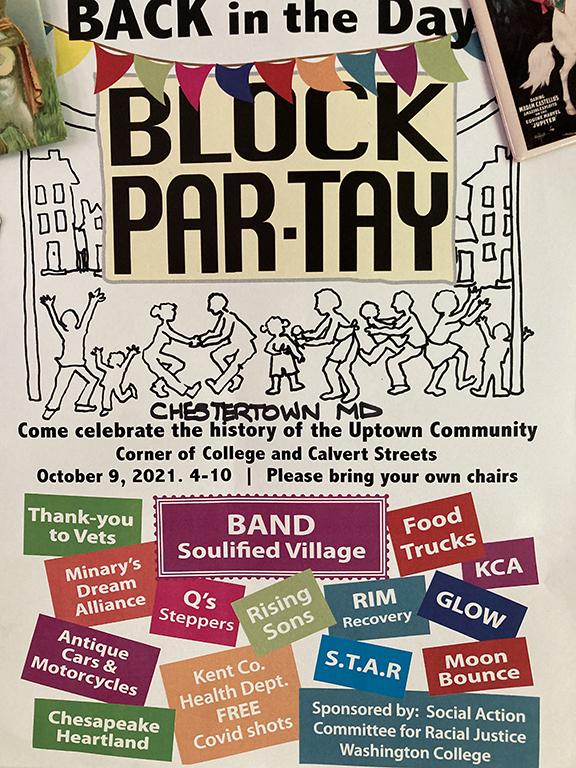Editor’s note: In light of Saturday’s celebration of the Uptown Community Saturday, October 9, The Spy would like to share this interview conducted by Leslie Prince Raimond.
Note from the editor of Here on the Chester. Pearl Johnson Hackett, her daughter Sylvia Hackett Frazier and their cousin, Rosie Perkins Herbert, grew up just a few steps from the Uptown Club, Charlie Graves’ is popular venue for black musical artists in the 1950s and 60s. The club on the northwest corner of College Avenue and Calvert Street, though smaller than Harlem’s Apollo Theater and Chicago’s Regal Theater, was a popular stop for black artists performing on the Chitlin’ Circuit—a loose network of jook joints, nightclubs, dance halls, bars, theaters and restaurants that flourished throughout the U.S. and especially in the South during the pre-Civil Rights era. Because of recording industry apartheid, which relegated black music to black audiences, black spaces and midnight-to-dawn time slots on radio, the Chitlin’ Circuit was critical to the economic survival of black artists who had not crossed over to mainstream audiences.

The Upton Club on the corner of Calvert Street and College Avenue. The Club closed in 1988 after almost three decades at this location.
Rosie: Charlie’s was the entertainment spot of the Eastern Shore… and the Western Shore. I can remember an influx of people coming from Wilmington, and Philadelphia, however the word got out, and this would be a crowded little town.
Pearl: When he had dances the cars were packed everywhere. You had to dress to go out!
Rosie: I’m going back in the era when the Nike Base was first built, and the soldiers started coming, and you had to dress up. And the ladies looked really good. They had their hairdos; they worked all week to get an outfit for the weekend…
Pearl:… to go down to Charlie’s… Because it was a popular place. You didn’t wear your work clothes to go there.
Sylvia: Back when I could remember, Mr. Charlie Graves used to wear a suit every day, with a big brimmed hat, and a tie… because he was the owner of the Uptown Club!
Pearl: We can go back to when Charlie had only the restaurant across the street. That was first period it was across the street, on the right-hand side. And then he went across the street and built a bar and dance hall period it must have been in the early 50s.
Sylvia: I always thought it was an old saloon… as little kids, we’d walk past and peek in…
Rosie: I remember first hearing about B.B. King coming to town… and then Fats Domino, and this is in the era of them first starting, getting on the Chitlin’ Circuit. When stars came to town, I guess it got too hot in the building, and he would open the back doors and everybody would stand there and see the stars. If you weren’t old enough to go to the show, you still got to see them.
Sylvia: Even Etta James was here.
Rosie: And the Franklin girls—Aretha, Erma and one name Carolyn I think.
Sylvia: You could almost say that from the James Brown—B.B. King era all of them have at least dropped in. Even Richard Pryor.
Rosie: Gene Chandler, Sam Cooke, Clyde McPhatter, The Platters, Duke of Earl…
Leslie: Otis Redding?
Rosie: Yes! Otis Redding! It was just THAT POPULAR. They didn’t have a showcase, and they weren’t getting paid much on that Chitlin’ Circuit. But it was a wonderful time. I remember seeing Ray Charles and Charlie always together like bosom buddies, and people saying “there go two Charlies.” Charlie Graves would be leading him. I was always an up-close person and I stood nearby and watched them. When Ray Charles died I had a great recollection of going back and seeing those times because the man came to Chester town more than once. He practically lived here.
Silvia: There was something about the town that they really liked. Because in my young day when Patti Labelle and the Bluebells came to town, they would walk up the street like they owned it… walking in their curlers and their Capri shorts… standing out there in the road.
Rosie: I think Patty came here even when there wasn’t a show. (laughter)
Rosie: Mr. Graves Uptown Club was the place to go! If a holiday came up and something wasn’t happening at Charlies, well, the town was dead. And the town is still dead today the entertainment is gone.
Sylvia: I thought I was everything when I got to go in there without getting permission. They used to have those matinees. I’d make sure I got my house cleaning done so I could be there and get a table. And I’d see all these people. They came from Delaware, and everywhere: good music, good food, and, sometimes, fights.
I can remember when James Brown’s bus came up Lynchburg Street, pulled up in front of our house, backed up and parked. Mom and her friends dressed up and went to Charlie’s, and the last words out of their mouths were: “Now don’t you come around that corner.” Well… they just shouldn’t have said it, because we needed to get our little peek. So we waited until she got in there good, and we went on in, and crawled in through the crowd on our hands and our knees, got our peek and went back home.
Rosie: The entertainers, before they got really big, we’re like ordinary people, and they associated with town-people like they always knew you. Remember when Little Richard came to town and needed a hairdo? He refused to go on stage without the hairdo. So Ms. Marion Lindsey did his hair… remember? She was a beautician on Lynchburg Street and he went there and got his hair done. Cause he’s cute now, and he was cute back then.
And when James Brown started getting bigger and bigger, and more people were coming to see him from everywhere, so they took it down to the Armory. I asked my mother a month in advance could I go see James Brown. She said no. Well “No” always meant “Yes” to me. I was like that then, and I’m like that now. I started getting my little clothes together. You had to have the new outfit. And it has to match. It was me and five more girls; we were all going to dress alike. I think it was black and white saddle shoes, socks that matched, black skirts…
Sylvia: Sharp!
Rosie: I start buying my little stuff and leaving it at their house. And the night James Brown comes I see my brothers getting ready. It was alright for them to go. I said umm-humm, when they go to bed I’ll sneak out and get dressed, so I snuck out, got dressed and went on down to James Brown. I did not care when I got home if I got beat, scorned or whatever. I was going! And my brothers came up to me and said, “what are you doing here? Mom is looking for you!” but I said to myself, I’m not going home ‘till the last dance! It was a great time.
Sylvia: I can remember when I was part of a local band. Charlie’d had his forty-some anniversary. Our band was Black Soul, and the girl singers were called the Blackettes. He had a great big table for his family and his brother came down from Jersey. And it was so special we went out and bought those green gowns with the back cut out. We sang our hearts out because we knew we were part of something special.
Rosie: I would base this on the Apollo… it was a culture center. It was entertainment: you saw dancing, and every once in a while the locals thought they should sing and they wanted to get up there and showcase themselves. No matter how it looked to some people, that was all we had. You have to sit back and embrace it today, ’cause there was a lot coming out of there in the form of art. I can remember those line dances.
Pearl: the Madison.
Rosie: yes, and those dance contests they had. There were guys coming from Annapolis. They were all tall men and they could step! That was the entertainment. They would push the chairs back and they would have a Chestertown group on the side, another group and maybe a Philadelphia group.
Sylvia: Back then it was hand dancing time. I remember seeing couples swinging across the floor.
Leslie: What were some of the other dances?
Rosie: There was one called Kill that Roach…
Pearl: (laughter). I don’t even remember that one.
On June 1st 1988, in the wake of a concerted palace police raid and drug bust, a bulldozer demolition wiped out the Uptown Club in a matter of an hour
Sylvia: It was heartbreaking, when it started going way down. And then they had that great big drug bust. They had all these people lying on the floor. I was getting ready to go, because I wanted to get my last goodbye. But people were running up and saying don’t go down there. And there were helicopters flying around, and I stood there and watched them knock the place down. It hurt me to my heart it really did.
Rosie: it took something out of our town, an era that was gone. The drug epidemic came in, and the place really went down.
Pearl: And Charlie was older then, too. And if he didn’t let them in, that would be a problem.
Rosie: They should have named something like a road after him. Charlie Graves Way or something.
Leslie: What were some of the segregation issues at the time?
Rosie: To know the closeness of the community that you live in is a beautiful thing. Compared to big city living this is paradise. The only thing though, looking back, about Chestertown, that was sad to me, is I did not have… not one… white friend. To look back and understand that era that I lived in, that was devastating to never know or never have any connection with someone my own age of another race. I didn’t get that feeling until I moved to this city at the age of 23 and met white friends. And I thought Oh my! What a waste.
It really was a Jim Crow town… I won’t say there was a lot of hatred then, but it was the way. By going away and coming back, I’ve picked up on some of (it) still here. And I can tell the ones who have been transplanted here. And as life goes on, layers go down and soon it will stop. And with everyone commuting now, it’s changing… that can be good and it can be bad… when you have families moving in from the cities in different parts of the world you bring in new changes. When I hear older folks talking and saying, “I wish it was like it was” I know they were regular home people.
We were blessed to have Mr. Charlie Graves Uptown Club in our time period. The performers who are still on the circuit that we go see today, we say Oh My! And I can go anywhere and meet someone today who remembers Chestertown, someone who came to see a B.B. King concert or one of the performances.
Recently I met a man who couldn’t believe that we had seen all these artists. Not in little Chestertown… you didn’t expect that… but it was the truth! This was the Apollo of the 50s. It was a time of change, and time of Black culture, and we saw all these artists. It’s the truth! The local white people didn’t come, so white people from the cities would drop down… they were the diehards and they enjoyed it
And it was a beautiful time.
Note: this article appeared in Here on the Chester: Washington College Remembers Old Chestertown, edited by John Lang and published in 2006 by The Literary House Press of Washington College.
Leslie Prince Raimond graduated from Washington College in 1963. She is the former Executive Director of the Kent County Arts Council, now Kent Cultural Alliance.




Sandra Hadaway McClary says
I remember the Uptown Club and hearing about all the top singers coming to lil ole C-town to perform. I was very young but I remember thinking when I would see these singers on TV I thought they were here. I remember the town was buzzing about James Brown coming. My father worked at Vita Food’s and heard the men talking about it.
Terra S. Deaton says
Nice article, wonderful memories shared. Looking forward to the block party on Saturday.
Ann Weber says
When my father was at Washington College in the late 20’s he would go to an earlier version of the Uptown Club to see greats of that day, including Billie Holiday.
Godfrey Clayton says
I am from Colman. I can’t remember all the stars coming to the Uptown club. I had moved on when they demolished the place. Excellent story. Thanks
Carl says
Wonderful story. I worked for George Hill JR Chester MD. Him an Richard King would tell me about all the Groups they went to see there. It was a place I hung out at often coming from Pondtown.
Dick Durham says
Great historic article! I was one of the very few white musicians to habituate the Uptown Club
and even the “Concrete Club” next door, which would open at 2AM(after the Uptown closed)..I was Jazz Johnsons’s pianist, and he used to cook the place; I learned so much from Jazz Johnson and his other band members, and glad I was able to be a part of the music scene in the late 60’s & early 70’s(Star struck youth that I was, I didn’t know the difference between skin colors, I just loved the personalities and the sweet, poignant soul that everyone projected. I believe music back then had
more soul, melodic sense, and meaning than a lot of “today’s” sound.
Jackie Black says
Yes Charlie’s was the place. Was lucky cause my area of growing up was last to enjoy some of the uptown club. Had a lot of memories that I’ll never forget.